Military Fiction and Military History
Explore the best military fiction and history books. Discover gripping novels and factual accounts of battles, strategies, and heroism from renowned authors and historians.

Book
Ancient Warfare
by John Carman
Setting out to establish a new understanding of human aggression and conflict in the distant past, the authors examine the evidence of warfare in prehistoric times and in the early historical period, in order to discover the motives and methods.

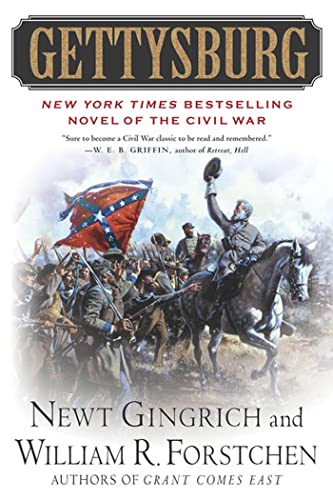
Book
Gettysburg
by Newt Gingrich
The Civil War is the American Iliad. Lincoln, Stonewall Jackson, Grant, and Lee still stand as heroic ideals, as stirring to our national memory as were the legendary Achilles and Hector to the world of the ancient Greeks. Within the story of our Iliad one battle stands forth above all others: Gettysburg. Millions visit Gettysburg each year to walk the fields and hills where Joshua Chamberlain made his legendary stand and Pickett went down to a defeat which doomed a nation, but in defeat forever became a symbol of the heroic Lost Cause. As the years passed, and the scars healed, the debate, rather than drifting away has intensified. It is the battle which has become the great "what if," of American history and the center of a dreamscape where Confederate banners finally do crown the heights above the town. The year is 1863, and General Robert E. Lee and his Army of Northern Virginia are poised to attack the North and claim the victory that would end the brutal conflict. But Lee's Gettysburg campaign ended in failure, ultimately deciding the outcome of the war. Launching his men into a vast sweeping operation, of which the town of Gettysburg is but one small part of the plan, General Lee, acting as he did at Chancellorsville, Second Manassas, and Antietam, displays the audacity of old. He knows he has but one more good chance to gain ultimate victory, for after two years of war the relentless power of an industrialized north is wearing the South down. Lee's lieutenants and the men in the ranks, imbued with this renewed spirit of the offensive embark on the Gettysburg Campaign that many dream "should have been." The soldiers in the line, Yank and Reb, knew as well that this would be the great challenge, the decisive moment that would decided whether a nation would die, or be created, and both sides were ready, willing to lay down their lives for their Cause. An action-packed and painstakingly researched masterwork by Newt Gingrich and William Forstchen, Gettysburg stands as the first book in a series to tell the story of how history could have unfolded, how a victory for Lee would have changed the destiny of the nation forever. This is a novel of true heroism and glory in America's most trying hour.

Book
The American Civil War
by Winston Churchill
Provides a short account of the American Civil War.
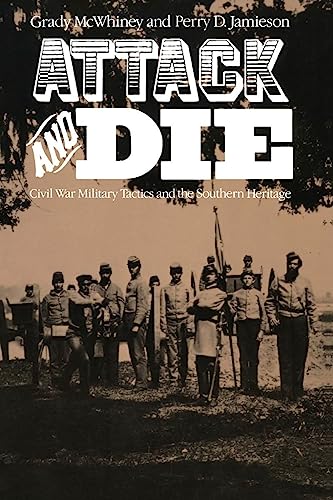
Book
Attack and Die
by Grady McWhiney
Why did the Confederacy lose so many men? The authors contend that the Confederates bled themselves nearly to death in the first three years of the war by undertaking costly attacks. Offensive tactics, which had been used successfully by Americans in the Mexican War, were much less effective in the 1860s because an improved weapon--the rifle--had given increased strength to the defenders.
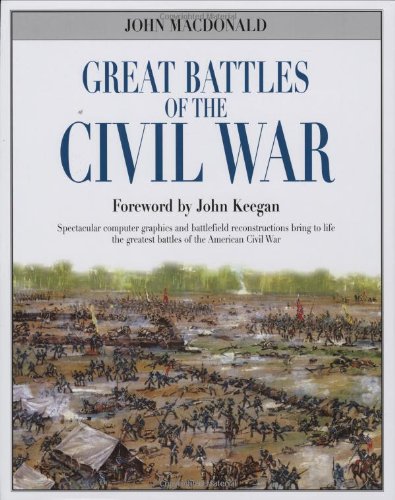
Book
Great Battles of the Civil War
by John Macdonald
Examines great battles of the American Civil War, from the first battle at Bull Run in 1861 to the Battle of the Five Forks in 1865.


Book
Stars and Stripes in Peril
by Harry Harrison
"HARRY HARRISON IS ONE OF SCIENCE FICTION’S MOST PROLIFIC AND ACCOMPLISHED CRAFTSMEN." —The New York Times Book Review In the midst of Civil War, a stunned North and South join forces to combat a sudden attack of British troops. Though the Americans are victorious, three years later a new threat emerges. Her Majesty’s Army is massing for a possible attack through Texas. Into the gauntlet Lincoln sends his chosen angel of death, General Ulysses S. Grant—while his top soldiers, including Robert E. Lee and William Tecumseh Sherman, plan the most daring naval invasion ever launched: an assault on British soil itself. Stars and Stripes in Peril is the new masterwork from one of the world’s most provocative authors. Venturing beyond a fascinating question of what if? Harry Harrison brilliantly examines the people and passions that make up nations both great and small—and shows how technology and politics had the power to shape history’s first great World War . . . half a century before it began . . . "Lovers of novels of alternate history hold Harry Harrison in high regard and his latest book can only enhance that esteem." —Abilene Reporter News

Book
Grant Comes East
by Newt Gingrich
The sequel in the bestselling series by Newt Gingrich and William R. Forstchen, continues the story of a Confederate victory at Gettysburg.


Book
How Great Generals Win
by Bevin Alexander
If a key to military victory is to "get there first with the most," the true test of the great general is to decide where "there" is—the enemy's Achilles heel. Here is a narrative account of decisive engagements that succeeded by brilliant strategy more than by direct force. The reader accompanies those who fought, from Roman legionaries and Mongol horsemen to Napoleonic soldiery, American Civil War Rebels and Yankees, World War I Tommies, Lawrence of Arabia's bedouins, Chinese revolutionaries, British Desert Rats, Rommel's Afrika Korps, and Douglas MacArthur's Inchon invaders. However varied their weapons, the soldiers of all these eras followed a commander who faced the same obstacles and demonstrated the strategic and tactical genius essential for victory. "All warfare is based on deception," wrote Sun Tzu in The Art of War in 400 BCE. Bevin Alexander shows how great generals have interpreted this advice, and why it still holds true today.

Book
1901
by Robert Conroy
The year is 1901. Germany’s navy is the second largest in the world; their army, the most powerful. But with the exception of a small piece of Africa and a few minor islands in the Pacific, Germany is without an empire. Kaiser Wilhelm II demands that the United States surrender its newly acquired territories: Guam, Puerto Rico, Cuba, and the Philippines. President McKinley indignantly refuses, so with the honor and economic future of the Reich at stake, the Kaiser launches an invasion of the United States, striking first on Long Island. Now the Americans, with their army largely disbanded, must defend the homeland. When McKinley suffers a fatal heart attack, the new commander in chief, Theodore Roosevelt, rallies to the cause, along with Confederate general James Longstreet. From the burning of Manhattan to the climactic Battle of Danbury, American forces face Europe’s most potent war machine in a blazing contest of will against strength.
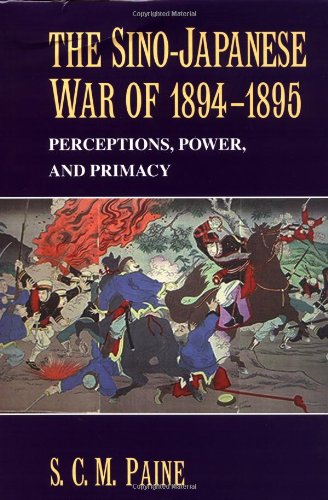
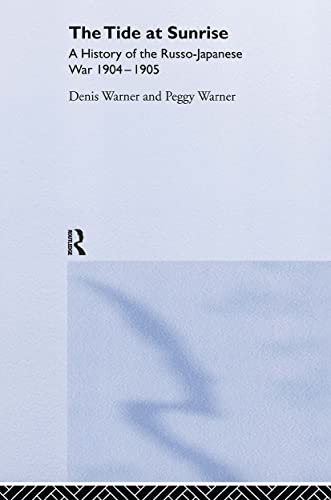
Book
The Tide at Sunrise
by Denis Warner
The Russo-Japanese War was fought in the waters of the Yellow Sea and the Straits of Tsushima that divide Japan from Korea, and in the mountains of Manchuria, borrowed without permission from China. It was the first war to be fought with modern weapons. The Japanese had fought the Chinese at sea in 1894 and had gained a foothold in Manchuria by taking control of Port Authur. In 1895, however, Japan was forced to abandon its claims by the Russian fleet's presence in the Straits of Tsushima. Tsar Nicholas had obtained a window to the East for his empire and Japan had been humiliated. Tensions between the two countries would rise inexorably over the next decade. Around the world, no one doubted that little Japan would be no match for the mighty armies of Tsar Nicholas II. Yet Russia was in an advanced state of decay, the government corrupt and its troops inept and demoralized. Japan, meanwhile, was emerging from centuries of feudal isolation and becoming an industrial power, led by zealous nationalist warlords keen to lead the Orient to victory over the oppressive West. From the opening surprise attack on the Russian fleet at Port Authur in 1904, the Japanese out-fought and out-thought the Russians. This is a definitive account of one of the pivotal conflicts of the twentieth century whose impact was felt around the world.

Book
The First World War
by John Keegan
The definitive account of the Great War and national bestseller from one of our most eminent military historians, John Keegan. The First World War created the modern world. A conflict of unprecedented ferocity, it abruptly ended the relative peace and prosperity of the Victorian era, unleashing such demons of the twentieth century as mechanized warfare and mass death. It also helped to usher in the ideas that have shaped our times--modernism in the arts, new approaches to psychology and medicine, radical thoughts about economics and society--and in so doing shattered the faith in rationalism and liberalism that had prevailed in Europe since the Enlightenment. The First World War probes the mystery of how a civilization at the height of its achievement could have propelled itself into such a ruinous conflict and takes us behind the scenes of the negotiations among Europe's crowned heads (all of them related to one another by blood) and ministers, and their doomed efforts to defuse the crisis. Keegan reveals how, by an astonishing failure of diplomacy and communication, a bilateral dispute grew to engulf an entire continent. But the heart of Keegan's superb narrative is, of course, his analysis of the military conflict. With unequalled authority and insight, he recreates the nightmarish engagements whose names have become legend--Verdun, the Somme and Gallipoli among them--and sheds new light on the strategies and tactics employed, particularly the contributions of geography and technology. No less central to Keegan's account is the human aspect. He acquaints us with the thoughts of the intriguing personalities who oversaw the tragically unnecessary catastrophe--from heads of state like Russia's hapless tsar, Nicholas II, to renowned warmakers such as Haig, Hindenburg and Joffre. But Keegan reserves his most affecting personal sympathy for those whose individual efforts history has not recorded--"the anonymous millions, indistinguishably drab, undifferentially deprived of any scrap of the glories that by tradition made the life of the man-at-arms tolerable." By the end of the war, three great empires--the Austro-Hungarian, the Russian and the Ottoman--had collapsed. But as Keegan shows, the devastation ex-tended over the entirety of Europe, and still profoundly informs the politics and culture of the continent today. His brilliant, panoramic account of this vast and terrible conflict is destined to take its place among the classics of world history.


Book
The Winter War
by Robert Edwards
"Edwards recounts events, both shameful and heroic, with insight, conviction and considerable wit." Publishers Weekly"

Book
War without Mercy
by John Dower
WINNER OF THE NATIONAL BOOK CRITICS CIRCLE AWARD • AN AMERICAN BOOK AWARD FINALIST • A monumental history that has been hailed by The New York Times as “one of the most original and important books to be written about the war between Japan and the United States.” In this monumental history, Professor John Dower reveals a hidden, explosive dimension of the Pacific War—race—while writing what John Toland has called “a landmark book ... a powerful, moving, and evenhanded history that is sorely needed in both America and Japan.” Drawing on American and Japanese songs, slogans, cartoons, propaganda films, secret reports, and a wealth of other documents of the time, Dower opens up a whole new way of looking at that bitter struggle of four and a half decades ago and its ramifications in our lives today. As Edwin O. Reischauer, former ambassador to Japan, has pointed out, this book offers “a lesson that the postwar generations need most ... with eloquence, crushing detail, and power.”

Book
Weapons of Choice
by John Birmingham
In a first installment of a three-part alternate history epic, America's World War II fleet is decimated by a multi-national task force sent back in time from the year 2021, forcing Admiral Nimitz and Rear Admiral Spruance to make the potentially consequential decision to fight their own possible descendants. Original.

Book
Fox at the Front
by Douglas Niles
In the wake of Hitler's death and Rommel's surrender to General Patton, the former foes join forces to take on a new enemy in the East where Stalin is preparing to lead the Soviet Union in a power grab that will jeopardize all Europe.

Book
A Damned Fine War
by Bill Yenne
From an amateur historian comes this novel of alternate history which explores what might have happened if General George S. Patton had gotten his way with the Soviets in 1945. "A great read. I highly recommend it."--Brian Sobel, author of "The Fighting Pattons." Original.

Book
Atlantis Gate
by Greg Donegan
It begins with ex-Green Beret Eric Danes's cataclysmic dream-of the earth engulfed in fire more than a quarter of a century ago. Is it a warning of things to come? Or a vision of what once was? And if the world's end came came in 1962, then where in the world are we today? The answer lies in a war beyond time, with an enemy beyond space, in a military thriller beyond your wildest dreams.